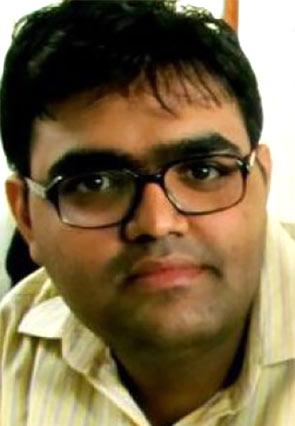
UPSC Civil Services Exam All India Rank 2 Munish Sharma who cracked the prestigious exam in his second attempt tells us how he did it.
The Union Public Service Commission (UPSC) declared the results of Civil Services Examination on June 12 this year.
As many as 1,122 candidates were selected for India's top jobs including Indian Administrative Service (IAS) and the Indian Police Service (IPS).
Gaurav Agrawal topped the list by securing maximum marks in UPSC Civil Services Examination this year, while Munish Sharma and Rachit Raj secured second and third positions respectively on the UPSC Result list.
Munish Sharma cracked the prestigious exam in his second attempt.
A Graduate in Biochemistry and Post Graduate in Management from Delhi's Lal Bahadur Shastri Institute of Management, Munish worked with reputed firms like KPMG before entering into Civil Services preparations.
In this interview Sharma says that he found adaption to the recent pattern changes by UPSC easiest part of his preparation.
He also shares an embarrassing moment during his interview stage where he could not answer complete name of 'Noida'.
We bring you more interesting insights from his preparation journey for Indian Administrative Services in this special interview with the topper.
Congratulations for your outstanding performance in Civil Services Examination! How did you celebrate your success?
Thank you. I have learnt to take success and failure in my stride. I took time out to be with my friends and family.
What were the key factors behind your brilliant performance?
I have always been a voracious reader. I was good at all subjects during school days. I also have good experience in teaching.
I am always open to constructive feedback. All these have made the difference.
Tell us something about your academic background and work experience?
I consider myself a scientist at heart, though working in the corporate sector has instilled the sense of business principles.
I went to MCL Saraswati Bal Mandir for schooling.
I completed my graduation in Biochemistry from Sri Venkateswara College, and post graduation in management from Lal Bahadur Shastri Institute of Management.
The common denominator at all these places was dedicated pool of faculty and a focus on basics.
I have worked at different organisations including The Smart Cube, KPMG and Team Computers.
Why did you want to become an IAS officer?
My school teachers motivated me to write these exams.
The desire to take them was rekindled after interacting with my Professor's husband, who is an IPS officer. I felt that Civil Services provide right opportunities to bring ‘change’.
What was your preparation strategy?
I never kept myself limited to silos of information. I followed a lot of newspapers and participated in meaningful discussions with my friends and teachers at my coaching institutes.
I focused more on basics than cramming data and facts.
What were your subjects at mains level?
I opted for law as an optional subject. Other subjects are compulsory for everyone.
Which were the easiest and the toughest parts of your preparation?
It was easy to adapt to recent changes by the UPSC. The changes are for good.
The tough part was to battle various issues at home; for instance, my mother had to undergo an open-heart surgery and my grandmother was detected with cancer.
Besides these, there were family health issues, and just two days prio exams, we had a theft at home, which made us all very high-strung.
What were the questions asked to you by the interview board? Which was the toughest?
I didn't know the full form of NOIDA. I had read it many years ago.
I had indicated that cooking was my hobby but I didn't know more than five synonyms for the word 'boiling'.
I was asked basic questions from my field of study. There wasn't anything tough.
It's never a test of knowledge, but of personality. The board was very cordial and supportive.
What was your interview score?
I got 204 out of 275 in the interview round.
Did you also find any uneasy moment during your interview?
There wasn't anything like that. Everything went smoothly.
How important is coaching to prepare for exams like Civil Services?
Coaching surely makes preparation simpler, but one needs to be careful while selecting the institute.
Besides studies, what do you do?
I am into experimental cooking, reading fiction and on science, writing poetry and listening to melody-based music. I am a tennis fan, but I'm not an expert in it.
What are your favourite books and movies?
The last film I watched was Filmistaan and the book I last read was Infero by Dan Brown.
I have many favourites, but love Lord of the Rings trilogy -- both, the book and the the movie.
Are you active on social media. How should aspirants use these platforms?
I am not on Linkedin because I haven't felt the need for it.
I sometimes look at the public posts of my favourite singers on Twitter.
I just follow scientific and academic journals and newspapers on Facebook and share interesting stories on my timeline.
It's a good way to keep in touch, but everyone needs to draw their own lines, should these start becoming counter-productive.
Personally, following these pages helped me a lot with current affairs.
Please share your valuable tips and message for Civil Services aspirants.
I would advise the aspirants to take all subjects seriously.
Don't lose focus.
Civil Services are not the end of the world. Prepare well, but be stoic about the results.
You would soon be joining bureaucracy. What are the top three agenda that you believe, should guide a bureaucrat?
A bureaucrat needs to be dynamic, neutral and sensitive. I look forward to learning more about the expectations during the training.
How big is corruption a problem, according to you? What is your model for solving this evil in our system?
I think the locus of battling corruption should be internal.
Make a start with yourself. Blame game won't bode well for our country.